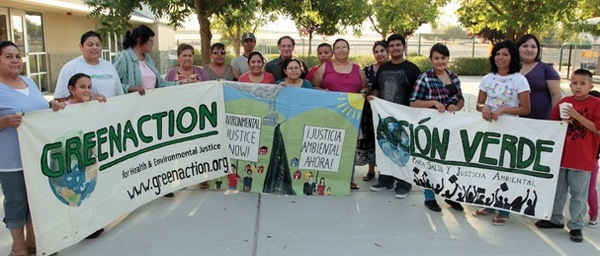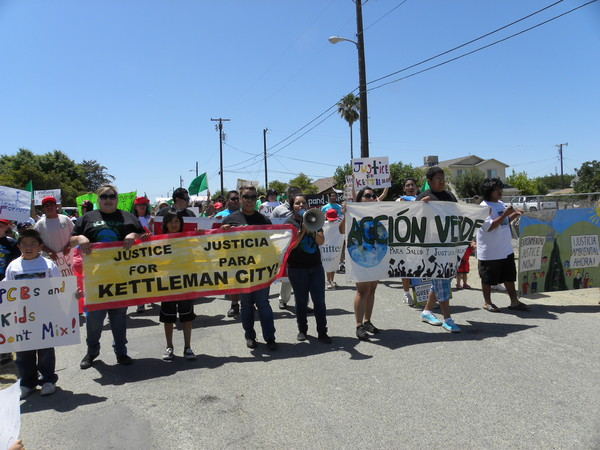
Although the cluster of birth defects in Kettleman City is now under a comprehensive investigation by state and federal environmental agencies, the situation has intensified as local advocacy groups filed an administrative complaint on June 18 against Kings County with the U.S. Department of Transportation under Title VI of the 1964 Civil Rights Act. They allege that the Board of Supervisors discriminated against Spanish-speaking residents by limiting their participation in hearings to consider expanding the toxic waste landfill operated by Waste Management Inc. located three miles outside the town.
In a related development, the California Legislative Latino Caucus, chaired by Assemblymember Tony Mendoza (D-Norwalk), requested an investigation of the allegations by California’s attorney general.
The civil rights complaint is being lodged by the Kettleman City organization El Pueblo para el Aire y Agua Limpio (People for Clean Air and Water). They are being legally represented by Ingrid Brostrum of the Center on Race, Poverty and the Environment, who outlined the reasons for the action, ” Kings County received funds from the Department of Transportation and they are not supposed to discriminate against people based on race or national origin. The complaint basically alleges that deciding on the hazardous waste dump and its expansion has a discriminatory impact on the Latino residents of Kings County and the process by which that expansion was approved was intentionally discriminatory against Spanish speakers and Latinos.” She said that if the DOT finds the allegations are true, it could withhold federal highway funding from the county.
The necessity for the complaint was underscored by testimony given in a special hearing of the Legislative Latino Caucus held in Kettleman City on June 17 to get an update from environmental investigators and hear from local citizens. Maricela Mares Allatore, a member of El Pueblo described a Board of Supervisors meeting held in October 2009 where Spanish speakers were given only half the time to testify as English speakers.
She described an incident that took place at that meeting when her father, a naturalized U.S. citizen who speaks English, complained about the procedure, “When he protested what he felt was an inequality in the testimony law he was surrounded by eight officers and thrown out of the meeting, and then my Mom was frightened and asked what was going on. This is when police officers shoved her roughly to the side, and this is a 60-year-old woman who walks with a cane. This was in front of Waste Management workers who were cheering and in front of my two children.”
Allatore also told the Latino Caucus about other instances of racism by Kings County officials such as being followed and having their automobile license plates being photographed. Allatore says that the county also discriminated against Latinos in their selection of a citizen advisory committee. The only Kettleman City resident chosen was a non-Latino who in the past has openly expressed racist sentiments against Mexican-Americans. This predominantly farmworker town of 1,500 has a population of more than 90% Latino ethnicity.
The panel of Latino Caucus legislators heard from others that testified a mixture of relief that the investigation was finally underway and criticism that it has taken the state so long to look for causes of the birth defect tragedies. Two more cases have come to light, bringing to 13 the total birth defects since 2005. Bradley Angel of Greenaction for Environmental Justice was scathing in his assessment of the state’s performance to date, “The agencies you have heard from have been complicit in the dumping of toxic waste in this community. They’ve literally misrepresented the company’s compliance track record. They failed to tell you that PCBs are a reproductive toxin. They have not told you that Chem Waste [Chemical Waste Management, Inc.] was in April given a public notice of improper disposal of PCBs, a reproductive toxin that can cause birth defects.”
The legislative panel heard a different message from Chris Speelman, the health and safety specialist at the toxic waste facility, who said his own family has been affected by birth defects. “It is my responsibility to protect this city. It is my responsibility to make sure that everything is done in compliance with environmental law, all the safety laws and in the best way to protect anybody who happens to be in this area. The thing that is really disturbing to me, the theme I have heard this evening, is this rush to throw away science when it is convenient for us.”
The difficulty of finding out why the cluster of birth defects is happening in Kettleman City was made evident by the complexity of factors involved and in the very nature of how bureaucracy works. During the testimony of Dr. Daniel Wartenberg, Assemblymember Alberto Torrico (D-Fremont) expressed frustration that the investigation seems to be progressing so slowly. He was informed that one reason is that the state Department of Public Health has not been forthcoming with raw data for him to study. Dr. Wartenberg is a nationally acclaimed expert on environmental epidemiology hired by the U.S. Environmental Protection Agency to help with the investigation.
Kettleman City residents wrapped up an eventful three days with a rally in the city park on June 19 where about a hundred people from throughout the state gathered to support their quest for environmental justice. Their sentiments were expressed by Marie Henderson from San Francisco, where she and her neighbors waged their own battles over toxic pollution caused by a Pacific Gas and Electric power plant, “We are here to show our support because we are mothers and fathers, we have our own children. We are here not just because we work with Greenaction, we are here because we were outraged to find out that we fought for eight years to shut down a power plant in Bayview-Hunter’s Point, and that they shipped tons and tons of PCBs down here to Kettleman City. At a meeting, we decided that not only would we no longer be dumped on but that the pollution that we fought so hard to get rid of would not be dumped on our neighbors.”
